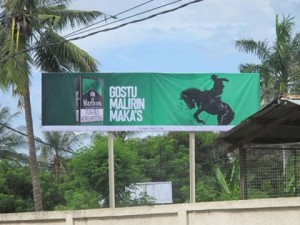Mary Assunta
Southeast Asia Tobacco Control Alliance

Photo: George Darroch
At its annual shareholder meeting in New York on 8 May, Philip Morris International (PMI) celebrated yet another successful year selling tobacco in more than 180 markets. In 2012 the company shipped 927 billion cigarettes, and earned revenue of more than $31 billion. It applauded the fact its sales, especially from emerging markets (euphemism for developing countries), had increased from 53% in 2007 to 61% in 2012. PMI claimed it had an estimated 16.3% share of the total international cigarette market outside of the USA (see the annual report here).
The American cowboy continues to make mega profits from the developing world, even from new, small countries like Timor-Leste in Southeast Asia. Timor-Leste ranks low on the Human Development Index at 134 out of 186 countries. Its GDP is $1.6b and 50% of its population live below the poverty line, with about 40% experiencing severe poverty. About 37% of its people earn US$1.25 a day.
To add to its challenges, it has a growing smoking problem. One third of adult men smoke, while an alarming 50% of teenage boys (13-15 years) and 17% of teenage girls smoke. A pack of cigarettes cost $1.00, and a Global Youth Tobacco Survey study showed 35% of all teenagers have an object with a tobacco logo on it.
Misleading descriptors on cigarette packs have been prohibited in the US since 2006, when tobacco companies lost a case brought against them under the Racketeer Influenced and Corrupt Organizations Act (RICO). However, outside the US, PMI continues to sell cigarettes with misleading claims such as ‘fresh’ and ‘gold touch’. PMI launched Marlboro Black Menthol in Asia in 2008, including in Indonesia, Malaysia, Philippines and Japan, promoting it as a “fresh taste sensation”. In 2009 Marlboro Black Menthol brand sold four billion units in Asia. PMI claimed each new introduction has a positive impact on the vibrancy of the brand across a wide range of markets through “a very positive ‘halo’ effect on the whole brand family.”
With high male smoking prevalence, Asia is a key PMI target region; between 2007 and 2012, its market share grew from 25% to 35%. It has identified several countries as exciting growth opportunities especially Indonesia, Philippines, Vietnam, Thailand, Korea and Bangladesh. Marlboro cigarettes are positioned as a key driver of growth, together with local brands such as A-Mild in Indonesia and Fortune in the Philippines.
PMI’s strategy to introduce several brand extensions of Marlboro such as Flavour Filter Plus, Gold Touch and Fresh capsule has enabled the company to sell 179 billion extra sticks, equivalent to 6% of its sales. The WHO Framework Convention on Tobacco Control (FCTC) Article 9 calls upon countries to regulate tobacco products specifically to address these types of extensions.
With an eye on the 750 billion sticks currently sold by state-owned monopolies, PMI has slated partnerships with these as the way forward to tap into markets. In Vietnam, through a partnership with Vinataba to produce Marlboro cigarettes, PMI is already seeing increases in Marlboro sales from 0.5% in 2009 to 2.8% of total sales in 2012. Vietnam has just passed comprehensive tobacco control legislation that bans tobacco advertising and promotions and requires 50% pictorial health warnings on cigarette packs, however strict implementation is needed and all loopholes plugged to arrest increasing cigarette sales.
The tobacco industry has shown it will aggressively pursue market expansion, frequently profiting even where poverty rates are high. Its sales are increasing. However as long as the tobacco industry is viewed “like any other business” by departments of trade, it will continue to milk its status as an investor and enjoy a thriving business. The industry is using the trade platform and bilateral investment agreements to challenge governments such as Uruguay and Australia who take stringent measures like prominent health warnings and plain packaging to protect public health.
Developing countries do not have the necessary resources to defend their public health measures in expensive, prolonged arbitrations. Tobacco cannot have the privileges (Article 5.3 Guidelines) accorded to other businesses and it cannot be treated like a normal product on the trade platform.